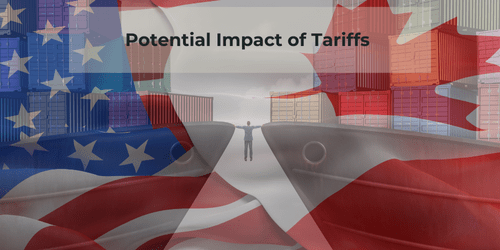As a mortgage broker in Canada, I keep a close eye on factors that influence interest rates and the overall housing market. One of the latest economic concerns is the ongoing tariff war, which has the potential to impact jobs, inflation, bond yields, and, ultimately, mortgage rates. Whether you’re a homeowner, potential buyer, or investor, understanding these ripple effects is key to making informed financial decisions.
How Tariffs Impact Jobs and the Economy
Tariffs are taxes on imports, often imposed as a strategy in trade disputes… or in this case, perceived trade disputes by the US. Tariffs imposed by the US are paid by US companies when they import products from the affected countries (Canada/Mexico/etc). Ultimately, the consumer bears the brunt of the tariff by way of increased prices on goods and services.
When tariffs are introduced, they can lead to higher production costs for businesses, particularly those reliant on international supply chains. In turn, businesses may cut jobs or delay hiring to offset these increased expenses.
For Canada, a prolonged tariff war could mean job losses in key industries such as manufacturing (especially automotive), agriculture, and resource extraction. Reduced employment levels lead to lower consumer spending, which weakens economic growth and can create a slowdown in the real estate market. This slowdown can occur from overall buyer confidence declining and buyers “sitting on the fence”, lenders tightening guidelines due to perceived risk, and a reduction in the overall number of buyers due to affordability issues.
The Effect on Bond Yields and Fixed Mortgage Rates
One of the key drivers of fixed mortgage rates is the bond market. When economic uncertainty increases, investors tend to move their money into safer assets like government bonds. This increased demand for bonds lowers their yields, which in turn influences fixed mortgage rates to trend downward.
If the tariff war continues and investor confidence weakens, we could see further declines in bond yields, leading to lower fixed mortgage rates. Some lenders have already begun adjusting their rates accordingly, and we’re closely monitoring these trends.
As of writing this post, we are seeing bond yields around the 2.6% range, which is the lowest they have been since early 2022 when the large increases started happening.
The Impact on Variable Interest Rates
Unlike fixed mortgage rates, which follow bond yields, variable mortgage rates are directly influenced by the Bank of Canada’s (BoC) policy rate. If tariffs weaken the economy, the BoC may cut interest rates further to stimulate growth.
Today, we’ve seen the BoC reduce rates by 0.25%, and if tariffs persist, some economists predict an additional 1% drop in 2025. This would lower the cost of borrowing for those with variable-rate mortgages and home equity lines of credit (HELOCs), providing some relief in an otherwise uncertain environment.
Inflation and the BoC’s Balancing Act
One challenge with tariffs is their impact on inflation. When the cost of importing goods rises, so do consumer prices. This puts the Bank of Canada in a difficult position—should they cut rates to stimulate growth, or keep rates steady to manage inflation?
If the BoC views tariff-driven inflation as temporary, they may lean toward rate cuts to prevent an economic slowdown. However, if inflation remains stubbornly high, we could see a more cautious approach to rate reductions.
What Happens When Tariffs End?
If the trade dispute is resolved and tariffs are lifted, we could see a return to economic stability. Business confidence would likely improve, leading to increased hiring and investment.
For mortgage rates, the effects would depend on how quickly the economy rebounds. Bond yields may rise, pushing fixed mortgage rates up, while a stronger economy may lead the BoC to pause or slow rate cuts for variable-rate mortgages. Either way, market conditions will shift again, making it important for borrowers to remain adaptable.
One key question is: if fixed rates increase, how high could they go? Another is determining the optimal timing to switch from a variable rate to a fixed rate, and whether or not that is even the best option. Rest assured, we continually monitor market trends and are committed to keeping you informed every step of the way.
What This Means for Canadian Borrowers
For those considering buying, refinancing, or renewing their mortgage, tariffs add another layer of uncertainty to the equation. While current trends suggest lower rates in the near term, economic conditions can change quickly.
The key takeaway? Mortgage interest rates should not be another source of stress in uncertain times. Whether rates fall further or stabilize, having a clear strategy tailored to your financial goals is essential. If you have questions about how these economic factors may affect your mortgage, I’m here to help navigate the changing landscape.


Recent Comments